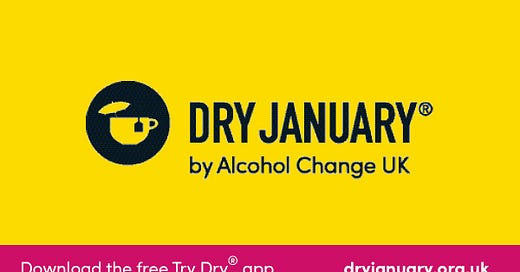Why participating in the Dry January challenge might just change your life
It did for me at least....
It would be strange if I didn’t write about sobriety in some form as one of my first posts here, wouldn’t it? After all, it’s likely the reason you’re reading this. I’ve shamelessly plugged my foray into writing via the platform I’ve built over the past six years, which almost exclusively discusses my sobriety journey – and here you are!
Did you know Alcohol Change UK they created the Dry January challenge?
Six Januarys ago (2018), I committed to my second Dry January after a December spent attempting to pickle myself with wine, beer, and shots of whatever I could find in my parents’ alcohol cupboard. I remember that Christmas for a few reasons: it was the last one we shared with my Grandad, it was my last Christmas as a drinker, and it was also the year I threw myself backwards onto an inflatable mattress and nearly knocked myself out on my parents’ fireplace.
It was my second attempt at abstaining from alcohol for thirty-one days; in 2017, I did the same thing and gave up on day ten. This time, I was lured away from the wagon by a glass of pink fizzy stuff on day twenty. However, I had done something I hadn’t before – nearly three whole weeks sober. To me this meant I wasn’t an alcoholic and could resume ‘normal’ drinking habits immediately. Wonderful!
There was part of me that felt like a failure for not completing Dry January, and truth be told, I continued dancing with the devil for another seven months. But I had gained something far more powerful – hope. It was the first time in ten years that I had committed to a period of abstinence from anything, actually. At the risk of sounding dramatic, I wouldn’t be writing this if I hadn’t failed miserably at Dry January both times. Gifting myself those moments of abstinence showed me that it was possible – and life wasn’t that terrible without alcohol.
It is important to acknowledge that Alcohol Change UK, and by extension the Dry January challenge, focus on reducing alcohol harm in the UK. Their aim is not for everyone to become sober. As my story above demonstrates, having a break from alcohol allowed me to reassess my relationship with it. Sobriety as an outcome was right for me. For some, it might be preferable to moderate, and for others, maybe it means they miss it so much they never participate again (I’ve yet to meet a person for whom this is the case).
Six years later, I know better than anyone that one’s relationship with alcohol is deeply personal and complex. Alcohol is woven into the fabric of our society, and whilst the tide is turning, I also don’t blame people for using it as a crutch. The world feels heavier than ever as I write this.
I’m not here to tell anyone to quit drinking, but I would encourage anyone to take a break once in a while to check that you have the balance right. Be it the Dry January challenge, Sober Spring, Sober October, Damp May, or Dusty December, I can promise you that time will be transformative. Worst case scenario: you’ll have more money in your bank account and better skin. Great news.
If you are embarking on the Dry January challenge this year, I am so excited for you. Know that it is not about perfection but about exploration. Ask yourself these questions as you go through the journey:
Who are you without a drink?
What do you enjoy doing?
What do you notice about how you feel in social situations without a drink?
What do you notice about your relationship with yourself?
Who are the people that light you up so much you don’t even notice you weren’t drinking? (Hold on to those people.)
When you got sad, did it increase your desire to drink?
What would life look like if you extended from one month to one year?
Whether it is your first Dry January challenge or your tenth, I am cheering you on.




